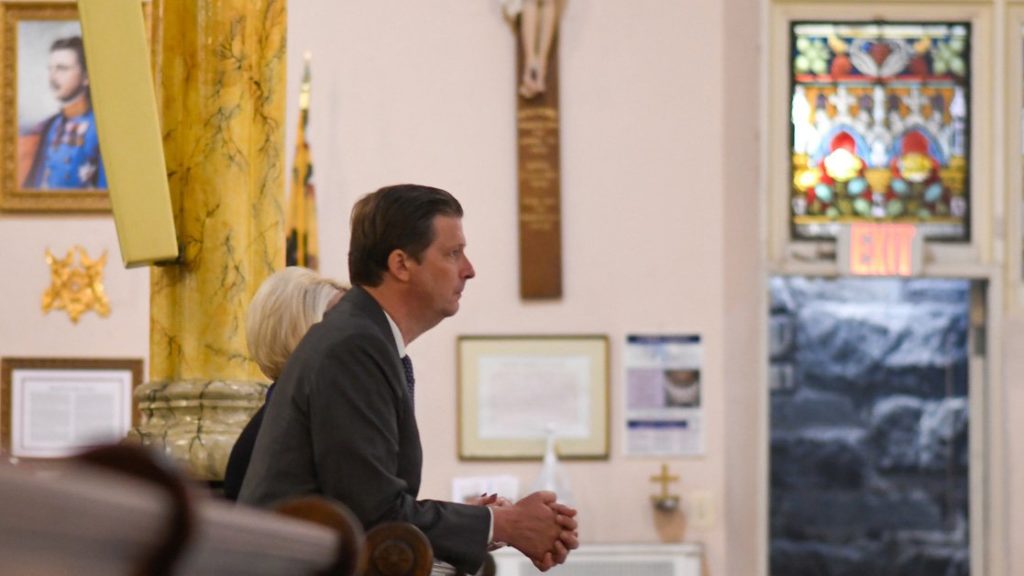Hungary’s ambassador to the Holy See Eduard Habsburg says that Pope Francis will find “a vibrant Christian country” when he visits Hungary this weekend.
In an interview with EWTN News, Habsburg said that Hungary has a “rich mixture of Christian churches living together very well” from Byzantine-rite Catholics to Calvinists.
Hungary is a Catholic-majority country in Central Europe with a significant Protestant Christian minority — 20% of the population, according to the Pew Research Center.
Both Prime Minister Viktor Orbán and President Katalin Novák are part of the Calvinist-oriented Hungarian Reformed Church, which has more than 1.6 million members.
“Most people are very surprised when I tell them that Viktor Orbán, our prime minister, and also Katalin Novák, our president, are both not Catholic,” Habsburg said. “And that is because in Hungary, we have about 60% Catholics, but we have about 15% Calvinists.”
“Now, Hungarian Calvinists are a very special brand. They’re very fierce, proud Christians that speak about their faith. And that leads to Christian faith being strongly present in our public space. And that leads to our government that has a high ratio of Hungarian Calvinists … to be very outspoken about faith.”
Christianity has a more than 1,000-year history in Hungary. St. Stephen, king of Hungary, led his country to embrace the Christian faith during the 11th century.
During Pope Francis’ previous trip to Hungary for the International Eucharistic Congress in 2021, “you could see that Hungary has a strong and vibrant faith,” Habsburg said.
“Two days before the pope arrived, there was a procession with 300,000 people following the Blessed Sacrament in the monstrance through the streets of Budapest. I’ve never seen anything comparable in any country in Europe over the last years.”
Hungarian aid for persecuted Christians
For the past six years, the Hungarian Ministry of Foreign Affairs has worked to help persecuted Christians in the Middle East, Nigeria, Pakistan, and other parts of the world through a program called “Hungary Helps.”
“I’m very aware that the pope knows about our activities for persecuted Christians worldwide,” Habsburg said.
Hungary Helps has collaborated with the apostolic nunciature in Syria on the Open Hospitals project, which aimed to ensure free access to medical care to the most vulnerable people in Damascus and Aleppo, and has made significant contributions to projects rebuilding towns in Iraq that had been destroyed by the Islamic State. The program also provides university scholarships to young Christians in countries at risk of persecution.
According to its website, one of the aims of the Hungary Helps program is to provide humanitarian assistance to help people to stay in their homelands rather than migrating to Europe.
During the pope’s trip to Hungary’s capital, Francis has added to his schedule a meeting with refugees from Afghanistan, Iraq, Iran, Nigeria, and South Sudan who have been aided by the Catholic Church in Hungary.
The pope will also meet with children from the Blessed László Batthyány-Strattmann Institute for the Blind, named for a Catholic doctor who dedicated his life to giving free medical treatment to the poor.
Helping refugees from Ukraine
As a country neighboring Ukraine, Hungary has welcomed more than 1 million Ukrainian refugees across its border in the past year with about 35,000 choosing to remain.
“It is the biggest humanitarian work we’ve ever done in Hungary,” Habsburg said.
“All of these people that have remained have received housing, school,” he said. “We have encouraged companies to take these people for work.”
With the ongoing war, the pope is expected to make peace in Ukraine a major theme of his trip to Hungary.
Pope Francis will meet with Ukraine’s prime minister one day before he departs for Budapest, where the pope’s first meeting will be with Orbán.
Orbán, while refusing to supply weapons to Ukraine, has condemned Russia’s full-scale invasion. Hungary remains very dependent on Russian energy, signing a new agreement this month to ensure its continuing trade with Moscow, according to AP.
Habsburg said: “There are only two voices in Europe that strongly, strongly advocate for peace, for immediate cease-fire, and peace negotiations — that is Hungary and the Holy See, that is Viktor Orbán and Pope Francis.”
On Saturday, Pope Francis will visit a Ukrainian Greek Catholic church that is providing aid to Ukrainian refugees.
The pope in his most recent Regina Caeli address called his upcoming trip to Hungary “a journey to the center of Europe, over which icy winds of war continue to blow, while the movements of so many people place urgent humanitarian issues on the agenda.”
He added: “But now I wish to address you with affection, dear Hungarian brothers and sisters, as I look forward to visiting you as a pilgrim, friend, and brother of all, and to meet, among others, the authorities, the bishops, the priests and consecrated persons, the young, the university community, and the poor.”
“I know you are making great efforts to prepare for my arrival: I thank you from my heart for this. And I ask you all to accompany me on this journey with your prayers.” You can watch the full interview with Ambassador Habsburg in the video below.

